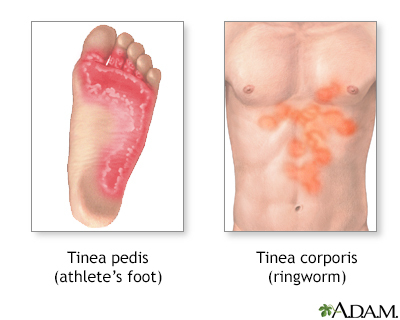Skin lesion KOH exam
Definition
The skin lesion KOH exam is a test to diagnose a fungal infection of the skin.
Alternative Names
Potassium hydroxide examination of skin lesion
How the Test is Performed
The health care provider scrapes the problem area of your skin using a needle or scalpel blade. The scrapings from the skin are placed on a microscope slide. Liquid containing the chemical potassium hydroxide (KOH) is added. The slide is then examined under the microscope. KOH helps dissolve much of the cellular material. This makes it easier to see if there is any fungus.
How to Prepare for the Test
There is no special preparation for the test.
How the Test will Feel
You may feel a scratching sensation when the provider scrapes your skin.
Why the Test is Performed
This test is done to diagnose a fungal infection of the skin.
Normal Results
No fungus is present.
What Abnormal Results Mean
Fungus is present. The fungus may be related to ringworm, athlete's foot, jock itch, or another fungal infection.
If the results are uncertain, a skin biopsy may need to be done.
Risks
There is a small risk of bleeding or infection from scraping the skin.
Gallery

References
Chernecky CC, Berger BJ. Potassium hydroxide preparation (KOH wet mount) - specimen. In: Chernecky CC, Berger BJ, eds. Laboratory Tests and Diagnostic Procedures. 6th ed. St Louis, MO: Elsevier Saunders; 2013:898-899.
Fitzpatrick JE, High WA, Kyle WL. Diagnostic techniques. In: Fitzpatrick JE, High WA, Kyle WL, eds. Urgent Care Dermatology: Symptom-Based Diagnosis. Philadelphia, PA: Elsevier; 2018:chap 2.